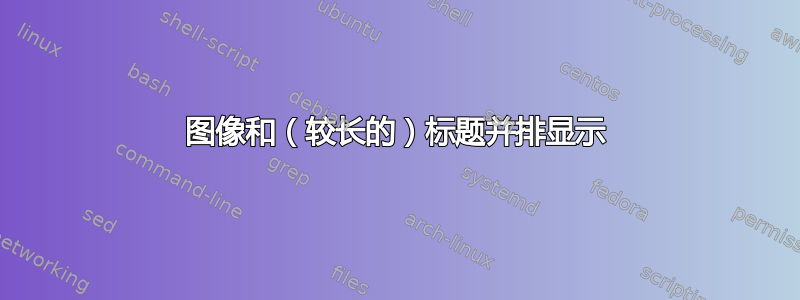
我尝试将这些图片并排放置。我尝试使用,\begin{minipage}但标题太长,尝试使用 /newline 进行调整会破坏格式。
有人有想法吗?
\begin{figure}
\begin{minipage}{0.45\textwidth}
\centering
\includegraphics[width=\textwidth]{images/RMSE.pdf}
\caption{\textbf{RMSE:} Auswertung des RMSE
nach $n\_epochs$ und dessen Lernrate
$lr = 0,01$ für die Datensätze:
Amazon Review, ML100K(+Features) und ML100K. }
\end{minipage}\hfill
\begin{minipage}{0.45\textwidth}
\centering
\includegraphics[width=\textwidth]{images/LR.pdf}
\caption{\textbf{Lernrate:} Auswertung der Lernrate ($0,1 / 0,01 / 0,001$) anhand des ML100K-Datensatzes. }
\end{minipage}\hfill
\end{figure}
答案1
您可以对每幅图像使用[t]op-aligned(或 anchored)minipage;如果两幅图像大小相同,它将按预期排列标题:
\documentclass{article}
\usepackage{amsmath,graphicx}
\begin{document}
\begin{figure}
\mbox{}\hfill
\begin{minipage}[t]{0.45\textwidth}
\centering
\includegraphics[width=\linewidth]{example-image-a}
\caption{\textbf{RMSE:} Auswertung des RMSE
nach $n\_\text{epochs}$ und dessen Lernrate
$lr = 0.01$ für die Datensätze:
Amazon Review, ML100K(+Features) und ML100K.}
\end{minipage}\hfill
\begin{minipage}[t]{0.45\textwidth}
\centering
\includegraphics[width=\linewidth]{example-image-b}
\caption{\textbf{Lernrate:} Auswertung der Lernrate
($0.1 / 0.01 / 0.001$) anhand des ML100K-Datensatzes.}
\end{minipage}%
\hfill\mbox{}
\end{figure}
\end{document}
答案2
使用该subcaption包。
\documentclass[10pt,a4paper]{article}
\usepackage[ngerman]{babel}
\usepackage{graphicx}
\usepackage[left=1.00cm, right=1.00cm, top=1.00cm, bottom=1.00cm]{geometry}
\usepackage{subcaption}
\begin{document}
\begin{figure}[htp]
\centering
\begin{subfigure}[t]{0.45\textwidth}
\centering
\includegraphics[width=\textwidth]{example-image-A}
\caption{\textbf{RMSE:} Auswertung des RMSE
nach $n\_epochs$ und dessen Lernrate
$lr = 0,01$ für die Datensätze:
Amazon Review, ML100K(+Features) und ML100K. }
\end{subfigure}\hfill
\begin{subfigure}[t]{0.45\textwidth}
\centering
\includegraphics[width=\textwidth]{example-image-B}
\caption{\textbf{Lernrate:} Auswertung der Lernrate ($0,1 / 0,01 / 0,001$) anhand des ML100K-Datensatzes. }
\end{subfigure}
\caption{Fig caption}
\end{figure}
\end{document}
答案3
你可以很简单地用以下方法实现floatrow:
\documentclass{article}
\usepackage{array}
\usepackage[demo]{graphicx}
\usepackage[export]{adjustbox}% for move images baseline to vertical center of image
\usepackage{caption}
\usepackage{floatrow}
\begin{document}
\begin{figure}[!ht]
\centering%
\setlength{\columnsep}{2em}
\begin{floatrow}[2]
\ffigbox[1.2\FBwidth]{\includegraphics[width=0.4\textwidth]{images/RMSE.pdf}}{\caption{\textbf{RMSE:} Auswertung des RMSE
nach $n\_epochs$ und dessen Lernrate
$lr = 0,01$ für die Datensätze:
Amazon Review, ML100K(+Features) und ML100K. }\label{fig-1}}
\ffigbox[1.1\FBwidth]{\includegraphics[width=0.4\textwidth]{images/LR.pdf}}{\caption{\textbf{Lernrate:} Auswertung der Lernrate ($0,1 / 0,01 / 0,001$) anhand des ML100K-Datensatzes.}\label{fig-2}}
\end{floatrow}
\end{figure}
\end{document}
答案4
我解决了。我使用了子浮点数并为其添加了一个额外的标题。
\begin{figure}[!tbp]
\centering
\subfloat[\textbf{RMSE-Auswertung}]{\includegraphics[width=0.48\textwidth]{images/RMSE.pdf}\label{fig:RMSE}}
\hfill
\subfloat[\textbf{Lernrate-Auswertung}]{\includegraphics[width=0.48\textwidth]{images/LR.pdf}\label{fig:LR}}
\caption{\textbf{(\ref{fig:RMSE})} Auswertung des RMSE nach $n\_epochs$ und dessen Lernrate $lr = 0,01$ für die Datensätze: Amazon Review, ML100K(+Features) und ML100K. \textbf{(\ref{fig:LR})} Auswertung der Lernrate ($0,1 / 0,01 / 0,001$) anhand des ML100K-Datensatzes.}
\end{figure}
\end{document}





